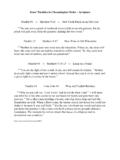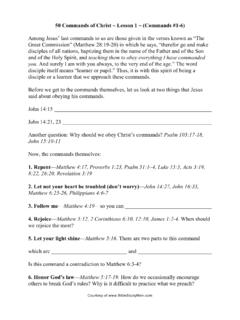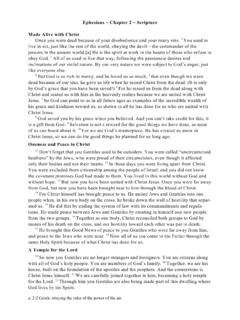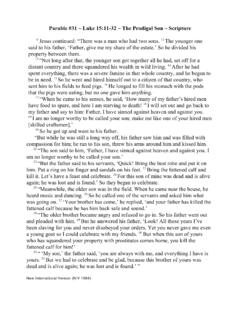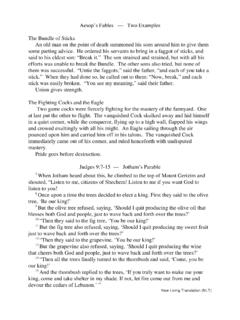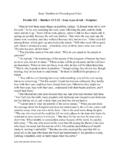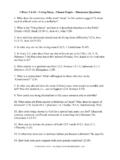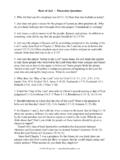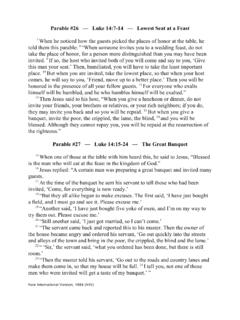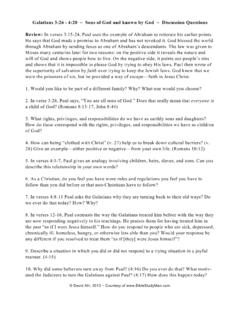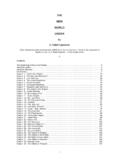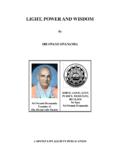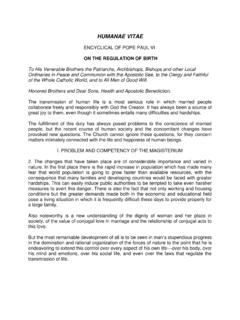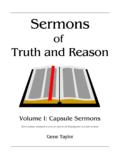Transcription of Jesus’ Parables in Chronological Order - …
1 jesus Parables in Chronological OrderParable #12 Matthew 13:24-30, 36-43 Weeds Among Good PlantsJesus told them another parable: The kingdom of heaven is like a man who24 sowed good seed in his field. But while everyone was sleeping, his enemy came25 and sowed weeds among the wheat, and went away. When the wheat sprouted26 and formed heads, then the weeds also appeared. The owner s servants came to him and said, Sir, didn t you sow good seed27 in your field? Where then did the weeds come from? An enemy did this, he The servants asked him, Do you want us to go and pull them up? No, he answered, because while you are pulling the weeds, you may root29 up the wheat with them.
2 Let both grow together until the harvest. At that time I30 will tell the harvesters: First collect the weeds and tie them in bundles to beburned; then gather the wheat and bring it into my barn. [In verses 31-35, jesus tells two short Parables about the kingdom of heaven.]The Parable of the Wheat and Weeds ExplainedThen he left the crowd and went into the house. His disciples came to him36 and said, Explain to us the parable of the weeds in the field. He answered, The one who sowed the good seed is the Son of Man. The37 38 field is the world, and the good seed stands for the sons of the kingdom.
3 Theweeds are the sons of the evil one, and the enemy who sows them is the The harvest is the end of the age, and the harvesters are angels. As the weeds are pulled up and burned in the fire, so it will be at the end of40 the age. The Son of Man will send out his angels, and they will weed out of his41 kingdom everything that causes sin and all who do evil. They will throw them42 into the fiery furnace, where there will be weeping and gnashing of teeth. Then43 the righteous will shine like the sun in the kingdom of their Father. He who hasears, let him hear. New International Version (NIV)Parable #12 ~ Matthew 13:24-30, 36-43 ~ Wheat & Weeds ~ QuestionsNote: this is the first in a series of eight Kingdom of Heaven Parables and theonly one explained by jesus .
4 After telling this, he expects you to get it. 1. Why do people dislike weeds?2. In this parable, who is the sower? What does the field represent? The wheat?The weeds? The enemy? The harvest? The harvesters?3. What did the servants volunteer to do for the owner of the field? (Vs 13:28)4. On what grounds did the owner turn down the servants suggestion? (Vs 13:29)How difficult is it to pull up only the weeds from a densely growing bed offlowers, Pachysandra, or even just grass? Can you always clearly identify theweeds from the good plants?5. What dangers lie in trying to label people as either weeds or wheat? 6. Whose responsibility is it to identify the weeds and deal with them?
5 7. What does this parable teach about church purity? Divine patience? Humanaccountability? 8. If you had to guess, what would you say would be the ratio of wheat to weeds in Morristown (or your home town)?9. How do these kinds of passages (threats of judgement and harsh punishment forunbelievers) make you feel?10. In what ways can you shine like the sun in your contacts with unbelievers?What does this mean? (Daniel 12:3) What does this say about Christians who tryto isolate themselves from non-Christians?11. It is possible to interpret this parable to mean that whatever you were at birth(weed or wheat) is what you remain to the end of the age. What do you thinkabout that?
6 12. What does this parable teach us about the kingdom of heaven (or kingdom ofGod)?Courtesy of #12 ~ Matthew 13:24-30, 36-43 ~ Leader s GuideThis commentary, which answers most of the 12 discussion questions, is based on material parable of the wheat and the weeds, or tares, follows the parable of thesower and four types of soils found in all three synoptic gospels, but this one isonly in Matthew. It seems to enlarge upon the seeds in the previous parable thatfell among the thorns and brambles which grew up and chocked the plants. Butthis is different. In the previous parable, jesus said the thorns represented theworries of this life and the deceitfulness of wealth.
7 In this parable, worldly worriesand deceitfulness may be some of the characteristics of the weeds, but primarilythe weeds or tares represent unbelievers and what jesus calls sons of the devil. As you delve into the parable, you find it filled with spiritual significance andtruth. But, in spite of the clear explanation of the parable that jesus gave (Matthew13:36-43), this parable is very often misinterpreted. Many commentaries andsermons have attempted to use this story as an illustration of the condition of thechurch, noting that there are both true believers (the wheat) and false professors(the weeds) in both the church at large and individual local churches.
8 While thismay be true, jesus distinctly explains that the field is not the church; it is the world(v. 38).This misinterpretation is not new; it s been misunderstood for centuries. Wayback in the third and fourth centuries, the Donatists like the Novatianists a centuryearlier held that the church must be a church of saints, not sinners, and theyshould be excluded. Augustine of Hippo in the late 300s used this parable to argueagainst them saying that jesus quite plainly identifies the field where the seed isplanted as the world, not the important point: when jesus speaks of the kingdom of heaven, he isspeaking of it in the world today, not as a distant destination where we go after thefinal judgement.
9 This can be a somewhat puzzling concept. We have Bible versesthat say the kingdom of heaven is already with us, but others say it is coming atthe end of the age. Here s an example of each: Luke 17:21 Nor will they say, Look, here it is! or There! for behold, thekingdom of God is in the midst of you. Matthew 7:21 Not everyone who says to me, Lord, Lord, will enter thekingdom of heaven, but the one who does the will of my Father who is in Luke, the Pharisees had asked when God s kingdom would come notrealizing it had already arrived. The kingdom of God (or of heaven) is not like anearthly kingdom with geographical boundaries. Instead, it begins with the work ofGod s spirit in people s lives and in relationships.
10 So the kingdom of God is aspiritual realm where God rules and where we share in his eternal life. We join thekingdom when we trust in Christ as out savior that s why it is here now and willcontinue into the eternal to the original parable. In the agricultural society of Christ s time, manyfarmers depended on the quality of their crops. An enemy sowing weeds wouldhave sabotaged a business. The tares in the parable were likely darnel (Loliumtemulentum, also known as poison darnel, darnel ryegrass or cockle) because thatweed, until fully mature, looks the same as wheat. Without modern weed killers,what would a wise farmer do in such a dilemma? Instead of tearing out the wheatwith the tares, the landowner in this parable wisely waited until the harvest.
